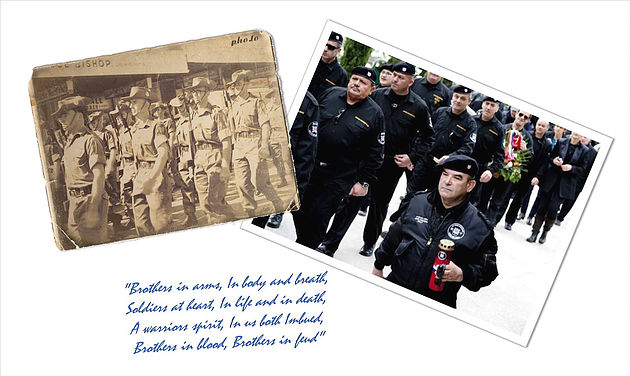
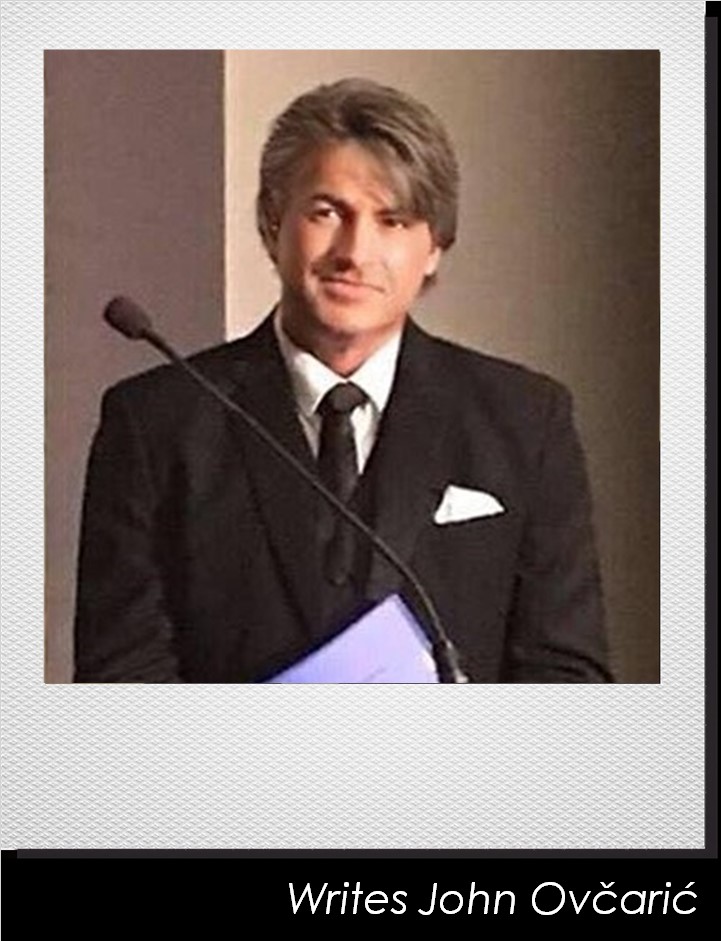 The parallels between two army’s worlds apart in terms of their objectives, enemy, and theater of war are also strikingly similar in the way they were, and in one case, are being treated by both their countrymen and politicians alike. In a poem by Thea Pound, titled “Brothers in Arms” which I have come to love, she writes
The parallels between two army’s worlds apart in terms of their objectives, enemy, and theater of war are also strikingly similar in the way they were, and in one case, are being treated by both their countrymen and politicians alike. In a poem by Thea Pound, titled “Brothers in Arms” which I have come to love, she writes
“Brothers in arms, In body and breath,
Soldiers at heart, In life and in death,
A warrior’s spirit, In us both Imbued,
Brothers in blood, Brothers in feud”
These words, so beautifully crafted speak to me of the comradeship that only admirable combatants, who have fought the good fight against one and other, feel for each other. It symbolises that in the end, should they survive or die at each other’s hand, they were merely the instruments of greater decision makers.
A man my not decide upon a disagreement one way or another, his convictions to take part in armed conflict may not mirror the balance of feeling that either his nation or fellow combatants may hold, yet the human spirit is more than often compelled to protect what it holds dearest being family, faith and nation and for this reason, one may often set aside one’s viewpoints under such circumstances.
During WW1, on more than one occasion, the two Waring sides, which had experienced horror and death previously unrivaled in human history called for ceasefires on a number of occasions, two such events that I recall from my study of these campaigns occurred between Australian and Turkish troops at Gallipoli and the other at what all refer to as “The Front” where German and allied troops experienced a stay of execution on the battlefields and trenches in France during the holiest of days over Christmas.
In these two examples, nor faith, nor political belief, race nor hatred prevailed.
In the case of Gallipoli, the stench from the dead on the battlefield forced both sides to call a cease fire, men crawled tentatively from their trenches on both sides and met in no mans land to tend to their brothers, the sadness of this all was that Australian and Turk alike helped bury each other’s as the war had ended for these casualties laying stricken across the cratered terrain together and most probably in instances in a macabre embrace due to the tragedy of how they fell.
The Turks today tender to Australia’s war dead and hold sacred and holy the places they lay, and in the words, from a speech by Mustafa Kemal Ataturk who is known for leading the Turkish war of independence, which led to the formation of the Republic of Turkey in 1923, and who was the leading military figure in the defense of Turkey against the Gallipoli landings these words clearly display what the term “Brothers in Arms” embodies.
“Those heroes that shed their blood
And lost their lives.
You are now lying in the soil of a friendly country.
Therefore, rest in peace.
There is no difference between the Johnnies,
and the Mehmets to us where they lie side by side
Here in this country of ours,
You, the mothers,
Who sent their sons from far away countries?
Wipe away your tears,
Your sons are now lying in our bosom
And are in peace”
After having lost their lives on this land they have
Become our sons as well”.
These words are engraved in stone upon a monument at Gallipoli and stand the test of time be their passing be in conflict, indifference or peace.
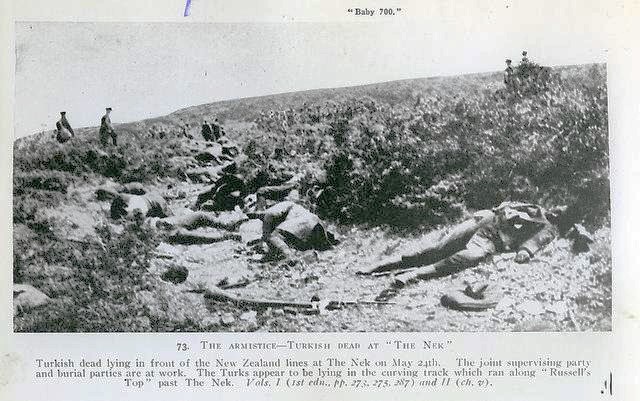
Another statue which stands as tribute to this spirit can also be found also depicting a Turkish solider carrying a wounded ADF officer, even though the story cannot be fully verified, the circumstances as reported by First Lieutenant Richard Casey stated………
“At that moment an incredible event occurred. A piece of white underwear was raised from one of the Turkish trenches and a well-built, unarmed soldier appeared. Everyone was stunned, and we stared in amazement. The Turk walked slowly towards the wounded British soldier, gently lifted him, took him in his arms and started to walk towards our trenches. He placed him down gently on the ground near us and then straight away returned to his trench”
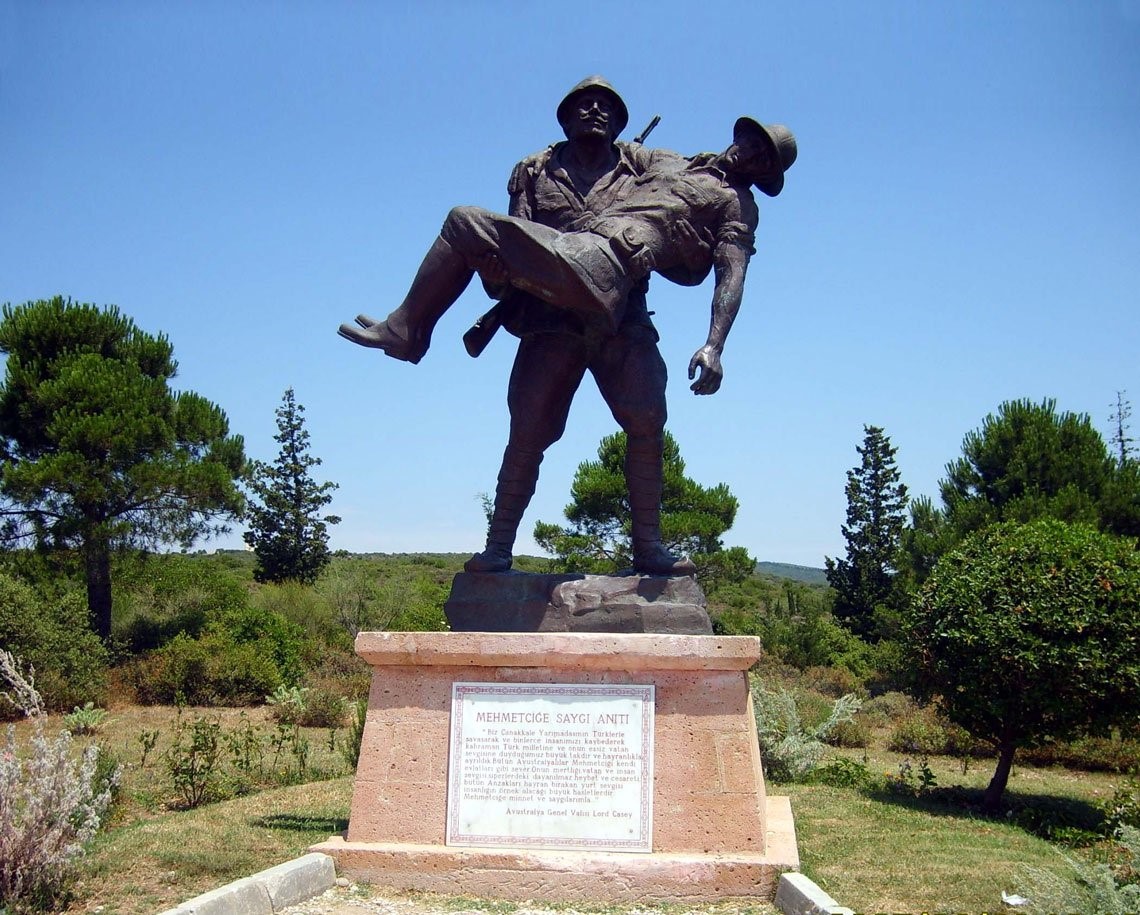
The Respect to Mehmetçik Monument at Pine Ridge, Gallipoli.
Post the cease fire, Australian war correspondent Charles Edwin Woodrow Bean wrote in his diary about the effects in May 1915 of allowing both sides to bury their dead in no man’s land and speak to each other as follows.
“A “change” has occurred in the Australian soldiers’ diaries now have entries such as “These Turks aren’t bad blokes.” He went on to add “It is extraordinary how the men have changed in their attitude to the Turks,” “Since the slaughter of May 19th … they have changed entirely. They are quite friendly with the Turks.”
The second occasion was in France on the Western front, known as the Christmas of 1914, it occurred only five months into WW1, a time when troops from both side had fought months before hand that the war would be over before Christmas and they would be home, instead hostilities had entered somewhat of a lull as leadership on both sides reconsidered their strategies following the stalemate of the Race to the Sea and the indecisive result of the First Battle of Ypres.
In the week leading up to the 25th, French, German, and British soldiers crossed trenches to exchange seasonal greetings and talk. In some areas, men from both sides ventured into no man’s land on Christmas Eve and Christmas Day to mingle and exchange food and souvenirs.
Consequently, there were joint burial ceremonies and prisoner swaps, while several meetings ended in carol-singing, men from both sides played games of football with one another, giving one of the most memorable images of the truce even though peaceful behavior was not ubiquitous; fighting continued in some sectors, while in others the sides settled on little more than arrangements to recover bodies.
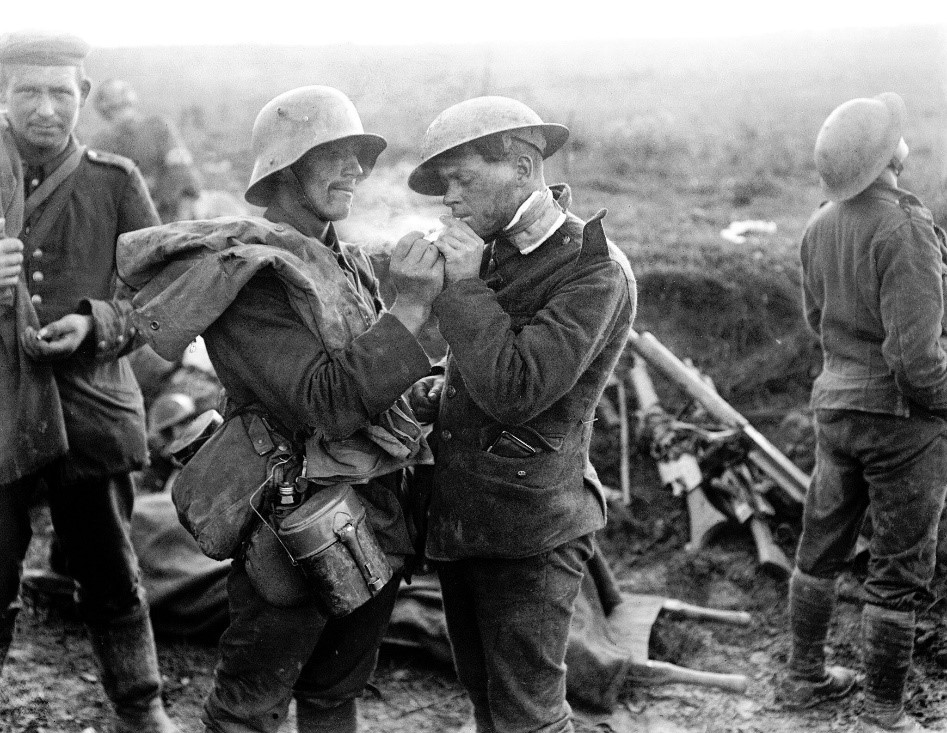
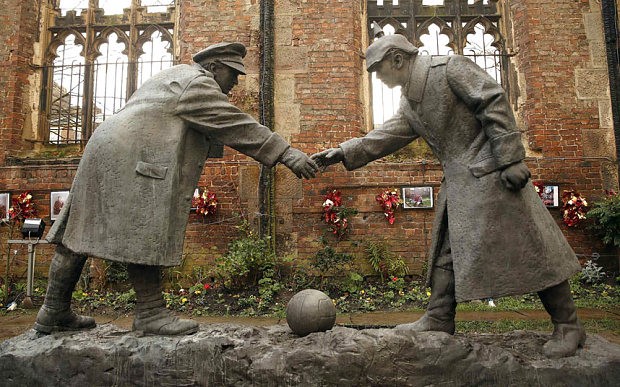
I needed to take you all down this rabbit hole and away from the main subject of this story in order to illustrate the fact that while mans inhumanity to man is the greatest of tragedies, comradeship can survive between honorable combatants and indeed this band of brothers baptised by the fires of war can and do hold much in common even after the final shot of conflict is fired.
I am not suggesting for a moment, that the circumstances our Homeland troops faced in either WW2 or the 1990-1995 Homeland war foster such respect between them and their advisories, I spoke of honorable men who followed a code of warfare that did not in the greater majority of instances, deviate from the agreed conventions of warfare, of men who followed instructions but by the same token held moral beliefs that dictated how they would conduct themselves. The Homeland war as we know was very much the opposite to this and scared our men deeply as a result. Admiration for their enemy peers is not expected nor demanded under any circumstances.
Yet it is our leaders that would have it this way, Leaders that are more so consumed with diplomatic, ethnic minority, and greater world opinion who at the cost of their own Veterans attempt to enforce through policy or belittling the sacrifices made by our men and women and as has been the case for 70 plus years, alter history, reality and consequently the truth.
Occasionally, even within what we consider to be progressive democratic and law-abiding countries, such occurrences have also occurred, but the key is that in time the truth was allowed to surface, discussion peaceful, civil and objective was had, and the misdeeds towards the nations veterans was apologised for and rectified.
Such was the case with Australian Vietnam Veterans and today instead, they are celebrated, respected and remembered.
Croatia’s Vietnam, apparently to our leaders, occurred within our own borders during 1990-1995, today as a nation and society, we suffer one of the highest suicide rates of war Veterans in the world, for just like the returning Australian “Diggers” from Vietnam, who were called all manner of thing including “Baby Killers” Australia once upon a time turned its back on them, disowned and dishonored them and today very much the same is occurring in the Homeland.
The situation became so bad in Australia that Vietnam veterans felt disillusioned, betrayed and felt the segregation of their ranks from their own association, The RSL (Returned and Services League) by not recognising them as true war veterans but rather as some form of U.N. Police who had gone off to Asia to participate in a civil conflict. (This is my personal view of how they were viewed and treated)
Three Australian Vietnam veterans made the following remarks in the Australian press
David Fiechtner, who served in the army during the war, kept his service a secret for more than 30 years.
“When I came home from the war, I had post-traumatic stress disorder, but I didn’t tell anyone I’d been there (Vietnam) – that was the best way,” he said.
“I kept it all hidden from everyone because of the attitudes that prevailed – the way we’re treated was awful.”
Mr Fiechtner, who now lives in Caboolture, north of Brisbane, was living in Maryborough when he finally joined an RSL and met a number of other veterans who had also been in hiding.
“A few of us decided in 1996 that we would march for the first time, but on the day over 40 guys turned up with us. They’d all been in hiding since the war,” he said.
“I used to feel like I wasn’t welcome – now I’m proud and I’ll be proud to be there on Sunday.”
John Smith, who fought in Malaysia and Vietnam, said the number of Vietnam veterans still “coming out” remained high.
“There’s plenty of new ones every year who march for the first time because they’ve been too scared or angry to do it before,” he said.
“It’s definitely got to do with the fact that attitudes towards us have changed.
“What went on when we came home was awful – but while we’re alive it’s never too late.
“I’m so glad that the majority of us are around to have seen these attitude changes take place.”
Rocky Rankin from RSL Queensland is a member of the Vietnam Veterans Motorcycle Club. He said members were still coming across “ferals” – veterans who have been living in abandoned mines and houses in the bush since returning home.
“These guys just disappeared after they came home and saw the attitudes everyone had,” Mr Rankin said.
“They went out bush, grew long beards and became hermits who never integrated back into society.
“We still see them when we are out riding in the bush and we’ve convinced some of them to come back and march with us in recent years.”
In 2006 official recognition occurred in Australia when on the 18th of August, which marked the 40th anniversary of the Battle of Long Tan, as well as Vietnam Veterans Day, which saw more than 500 Australians dead and about 3,000 were injured as a result, then Prime Minister John Howard apologised to Australia’s 50,000 Vietnam Veterans, for the treatment they received when they returned from the war.
On the 17th, in the Australian Parliament, the Prime Minister paid tribute to those who served in Vietnam stating the following
“The sad fact is, Mr Speaker, that those who served in Vietnam were not welcomed back as they should have been at the time.
And I think the nation collectively, Mr Speaker, whatever our views may be, and I include those who supported the war as well as those who opposed it, we collectively failed those men at the time, and they are owed our apologies and our regrets for that failure, Mr Speaker.
And the very least that we can do on this 40th anniversary is to acknowledge that fact, to acknowledge the difficulties that so many of them have had in coping with the post-war trauma, and the magnificent contribution that they have continued to make to our nation.
So this afternoon and tomorrow, Mr Speaker, we will in different ways, and I know in a totally bipartisan fashion, pay proper regard to their bravery and their service, and their commitment.
They did what their country lawfully asked them to do at the time, they did it with distinction, with honor, and with bravery, and they should have been more properly honored some 40 years ago for that”
When we consider some of these very limited facts and remarks, we can without hesitation recognise a very similar pattern of perception and treatment by our own Croatian Government towards our own Veterans, and I say this with the greatest respect and focus towards the 1990-1995 Homeland war veterans but in the same breath do not hesitate extending such view and treatment to the few remaining WW2 Veterans alongside those that have already passed over life among us.
Treatment of the Croatian veterans is not indifferent to their Brothers in Arms in Australia, be it non recognition of their service, non-recognition of their accomplishments, non-recognition of their rights to be protected under law against mis-justice brought about by falsehoods of war crimes were they are offered up to appease state policy rather than protected and preserve Statehood, the condemnation of their insignia, their colors, their military service arms or any other manner of association during those dark years of battle. All these things are neither indifferent nor less deserving of any Government or its people to be able to change the situation.
The greatest tragedy, mush like the “Australian Ferrel veterans” mentioned earlier, is that they suffer and die at their own hand much like their Australian Veteran brothers did, yet as tragic is that while the lesson was a long and argues one for Australian democracy, 40 years, Croatia it seems will never yield to changing all its wayward ways before the last of its Veterans takes his dying breath by which time it will be all too late.
Yes, Croatia does celebrate its Veterans, but on a day to day basis fails miserably in every other way to address many many issues facing them and as we see even as I write this, are content in distorting events, individuals, history, insignia and phrases for the good of others such as ethnic minorities and their EU Masters rather than doing that which is righteous and true.
Awake Croatia, or as Marko Perkovic Thompson sang…………….
“Tell me Brother
Are we that cursed
And so quickly forget everything
But God forbid
That they would need us again
As that thick fog
Would once again descend.
Don’t ask me anything
But instead
Light a candle
For all those who for the homeland fell”